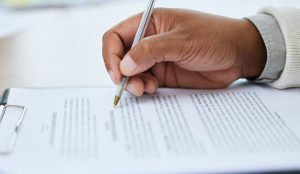If you’re a self-employed freelancer or contractor, you have a legal obligation to keep certain records. These laws apply whether you’re a sole trader, or you’re in a partnership.
These records are mainly for your own use, so you can effectively work out your profit or loss when submitting your self-assessment tax return. There’s no need to send any records as part of your return. However, HMRC may request to see your records as part of an investigation, which is why it’s vital to keep full, detailed, and accurate records.

What Records Do You Need to Keep if You’re Self-Employed?
You are legally required to keep records of:
- All of your sales and income. Read our guide to turnover for the self-employed.
- Relevant business expenses. Read our guide to allowable expenses for self-employed workers.
- If you’re registered for VAT, you’ll have to keep VAT records.
- If you employ any staff, you’ll need to keep Pay As You Earn (PAYE) records.
As part of your tax return, you’ll have to tell HMRC about your personal income, whether that’s from savings, investments, pensions, rent, or from overseas sources. So it’s also important to keep records about your personal income.
And finally, if you received any grants from the Self-Employed Income Support Scheme, you’ll have to keep records of how much you were paid.
How Do I Keep These Records?
HMRC accepts certain items as “proof” of your income or expenditure. This includes receipts for goods, stock, and expenses; bank statements and chequebook stubs; and invoices, till rolls, and bank slips for sales.
Read more about what counts as “proof” of your income and expenditure in our full guide.
Types of Accounting Records
This is where things get a little bit complicated. As a business owner, you have a choice of accounting methods to use:
- Traditional Accounting – In which you record your income and expenses by the date you were invoiced or billed.
- Cash Basis Accounting – In which you only record income or expenses when you receive money or pay a bill. This means you don’t need to pay tax on any money you’ve not yet received in your accounting period.
If you’re using the traditional accounting method, you may have to keep more detailed records. This is so your tax return can include certain information, such as:
- Money you’re owed but have not yet received. Outstanding invoices should cover this.
- Money you’re committed to spend but are yet to pay out. Unpaid invoices you’ve received should cover you here.
- Year end bank balances.
- How much you’ve invested in your business in your accounting year, and how much money you’ve taken out for personal use.
How Long Do I Need To Keep Self-Employed Business Records?
According to HMRC law, you need to keep your records for at least five years following the 31 January submission deadline of the relevant tax year.
So for example, you’ll need to keep your records for the 2021-2022 tax year until at least the end of January 2028.
Read our full guide to how long you need to keep your records.
Further Support For Self-Employed Freelancers and Contractors
Keeping full, detailed, and accurate tax records will make completing your self-assessment tax return a lot easier. But the main reason you have a legal obligation to keep good records is because you’ll need to offer total transparency if HMRC ever targets you for an investigation.
HMRC investigations can be costly and time-consuming for self-employed freelancers and contractors. But insurance can cover your legal expenses in the event of an investigation.
At Tapoly, we specialise in bespoke insurance packages specifically designed to meet the unique needs of self-employed workers. You can get all the cover you need for as little as 35p a day, with no hidden fees. Get a free online quote in minutes.
If you have any questions or would like to discuss your options please contact our Tapoly team at info@tapoly.com, call our helpline on +44(0)2078 460 108 or try our chat on our website.

